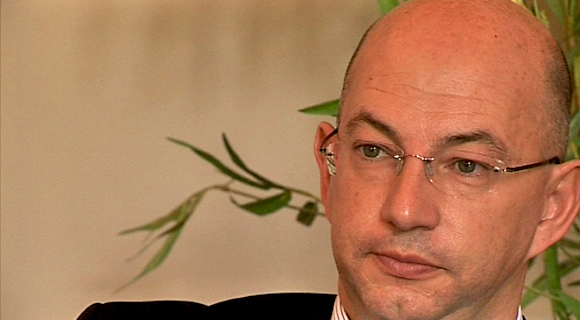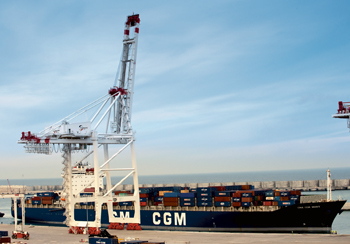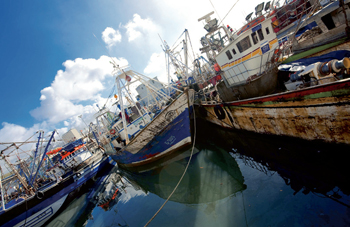Business Climate in Morocco
French Morocco Chamber of Commerce and Industry, Director General, Dominique Brunin
Today there are three main difficulties. One is the difficulty of accessing land, the legal and judicial environment remains difficult and third is the access to human capacities and resources.
Interview with Dominique Brunin, Director General of French Morocco Chamber of Commerce and Industry

Can you talk about the history of the Chamber and the role it is now playing in Morocco ?
The Chamber has a long history in Morocco ; it was created in 1913, and until the independence of Morocco in 1956, the French Chamber was the national chamber of Morocco. At that stage it was directly involved in the management of the Casablanca Harbor, and the major infrastructure development, in exactly the same way chambers of commerce are involved in infrastructure and business activities in France. In 1956 the Chamber became the French Chamber of Commerce and Industry in Morocco, representing French business as a foreign entity. Since then the Chamber has grown and developed new activities.
Today there are three main difficulties. One is the difficulty of accessing land, the legal and judicial environment remains difficult and third is the access to human capacities and resources.
We are a member of the Union of French Chambers of Commerce and Industry abroad. The proximity, connections, and relationships that France and Morocco have together have given us the opportunity to develop a very strong Chamber of Commerce here in Morocco. The headquarters of the Chamber are in Casablanca, but we have offices in all the major cities in the country : Tangier, Agadir, Meknes, Marrakech, Oujda. The Chamber is directly involved in the development and management of business parks ; today we have two business parks, and we are already looking at the opportunity to develop a third and fourth one, maybe in Fez or Marrakech.
We are directly involved in training and education and have close to 500 students here on the campus of the Chamber, as well being involved in business support, both for French companies that are looking at Moroccan markets for investing, or developing exports to or from Morocco, and local Moroccan companies that are members of the Chamber. We gather 3,500 French and Moroccan companies, and we provide support to these businesses.
What is your agenda for 2011 ?
The agenda for 2011 is very close to the agenda we had for 2010. We are organizing a number of professional exhibitions. We have an exhibition on the transport industry, which is going to be taking place in March. We have an exhibition on the building industry, which is going to take place in June, and we have a professional exhibition that will be taking place by the end of the year on industrial partnerships between France and Morocco, and other European countries.
Also, the Chamber is representing the French Agency for the Promotion of Companies. We will be organizing French pavilions at major local trade fairs on IT and agro-industries, and the fishing industry. The second major element of our 2011 agenda is in the field of training and education. We will be launching new training programs in the management field for engineers and scientists who are going to be having positions on executive committees within the companies they operate and who don’t have training in the field of management.
The third major element of the agenda is going to be the pursuit of the development of our activity in the field of business parks, completing the second business park, launching the third, and completing preparations for the fourth.
Morocco is ranked 114 out of 183 economies in ease of doing business. What is your personal perception of ease of doing business in Morocco ?
One has to be very careful when looking at these figures. Doing business in Morocco is something that is very easy but requires some precautions and preparation. You can very easily set up a co mpany in a very short period of time, and the country has positively evolved tremendously in the last ten years. In 2010 we created close to 60 companies, and were close to the same figure in 2009.
mpany in a very short period of time, and the country has positively evolved tremendously in the last ten years. In 2010 we created close to 60 companies, and were close to the same figure in 2009.
Morocco today has a tremendous effect on French companies in particular, and the attraction of Morocco is extremely strong. We have the habit of presenting Morocco to small and medium-sized companies by saying that there is not a single small or medium-sized company which shouldn’t consider looking at Morocco as business opportunity. Doing business here is not easy, but neither is doing business anywhere in the world. The competition is fierce, and there are very strong networks of local Moroccan companies in many different fields.
The international competition from Spanish, Italian, and German companies is also severe. But all the different positive factors position France as a leading partner on the economic, human, social, cultural, and educational front. These advantages make the situation easier for French companies, but they also have to be careful and look at how they are going to do business, and with whom. There are rules ; it’s not the kind of place where you can do anything in any type of conditions, and you have to respect the rules ; if you do so, you can become a very happy company.
What would you identify as a principal problem or challenge for international companies that are establishing headquarters in Morocco ?
In the ’80’s, the French Chamber of Commerce organized a comparative survey of difficulties or barriers that companies faced doing business in Morocco. At that time, we surveyed about 80 different difficulties. We did the same survey in 2009, and basically, today there are three main difficulties. One is the difficulty of accessing land, and the rules of property.
It is difficult today to set up a company when you need to have a strong industrial base and the access to land remains difficult. The legal and judicial environment remains difficult, and any company has to do its best to avoid, at any stage of its development, having to go to justice. The third factor, which is rather a new factor, is the access to human capacities and resources. Morocco used to offer to companies the opportunity to recruit any type of profile without problems, up until recently.
The development of local and foreign investment in the country has put such a pressure on human resources available in Morocco so that today it is slowly becoming a problem. The need for training and education, at primary, secondary, tertiary, and professional levels is being perceived as a new difficulty for companies. These remain basically the last three factors that can put pressure on Morocco for the future attractiveness of the country.
How do you see the progress and reforms affecting Morocco’s long-term direction and where do you see Morocco in the future ?
We are convinced that Morocco is going to play a major role in the years to come. For the last ten years in particular Morocco has undergone major transformations. The infrastructure level of the country, like railroads, airports, and IT infrastructure has tremendously improved. The social changes that the King has imposed have had a tremendous impact in the society.
The economic transformation from a country that was looking inwards to an outward-looking structure ; the signature of free-trade agreements by Morocco with the US, the EU, and Arab Gulf countries ; opening negotiations with sub-Sahara Africa ; all these factors have tremendously transformed the country. We are convinced that Morocco will be playing a major role within the European and Mediterranean environments at least, but also most probably in the African continent. It is geared to becoming a leading economic player of the 21st century.
How do you deal with the challenge of availability of land for the business parks you are developing ?
We designed a specific approach to help French and Moroccan companies access land in easier conditions through the business parks we have been designing. The system we have established is that companies do not buy land, it is on a rental basis. It has been developed with a very strong partnership between the Moroccan Ministry for Industry and Trade. We have positioned parks towards smaller and medium-sized companies, regardless of where they are from. We have organized things to make sure their investment is going to be fast, efficient, and with returns for the companies and for Morocco.
How difficult is it to sell the idea of doing business in Morocco ?
I wouldn’t say it is difficult. All of the trade fairs and exhibitions we participate in help us to communicate and present the opportunities Morocco offers. In the past few years we have been dealing with an increasing number of requests from French companies about Morocco, and we have been advising and working with these companies. We participate directly, meeting around 1,000 companies a year to present the opportunities for investing in Morocco and the possibilities that the Moroccan markets offer.
Being a member of the network of French Chambers of Commerce Abroad and in France, we organize between 30-40 information seminars for French companies a year, in all the different chambers of commerce in France. There, we meet with companies and discuss opportunities. We also participate directly in a number of trade exhibitions in France geared to foster and develop French foreign trade. Being the direct partner of the French agency UB France helps because UB France orients companies expressing an interest for Morocco to us.
The transformations and attractiveness of Morocco as well as the close relationship between Morocco and France help us to a tremendous degree. The popularity of Morocco in the minds of French business people is extremely high. The difficulties that neighboring countries have undergone over the past couple of years has also helped Morocco to have a more favorable and positive image.
As a Chamber, what is your main target in terms of revenues ?
The Chamber is a non-profit association, and we do not work in terms of looking at what we are going to make. We have to make revenue to enable the Chamber to invest ; we have a very large campus at the outskirts of Casablanca with 500 students, and we need to provide all these Moroccan students the best programs and equipment. What the Chamber actually earns is directly re-invested in the different activities. We are 100% self-financed by the membership that the companies pay to the Chamber, and by our activities in terms of consulting and advising companies, and training and education.
What is the focus for development of the Chamber ?
Our focus for developing the Chamber would be on parks, training and education, and enlarging the membership base. This is going to be the focus for the next 3 years ; we have a new president, starting January 1st, 2011, and those will be our areas of focus in our strategic plan for 2011 and the years to come.